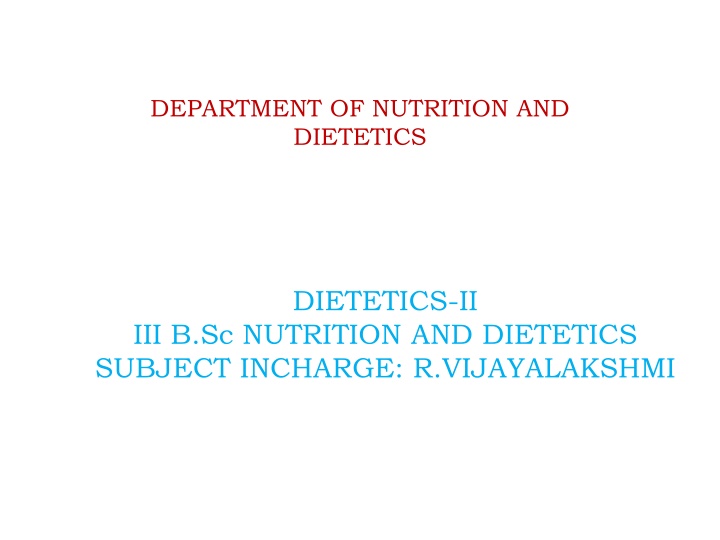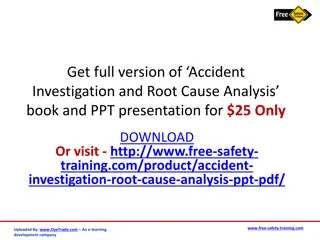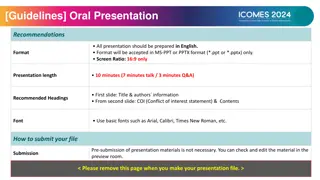
Role and Importance of Dietitians in Nutrition and Dietetics
Learn about the crucial role of dietitians in nutrition and dietetics, including their responsibilities in educating and advising on diet, providing support through treatment, and promoting nutritional well-being. Explore the fundamental skills of counseling, aims of diet therapy, and essential qualities a dietitian should possess. Discover the principles of diet counseling and the significance of exchange lists in introducing variety to diet prescriptions.
Download Presentation

Please find below an Image/Link to download the presentation.
The content on the website is provided AS IS for your information and personal use only. It may not be sold, licensed, or shared on other websites without obtaining consent from the author. If you encounter any issues during the download, it is possible that the publisher has removed the file from their server.
You are allowed to download the files provided on this website for personal or commercial use, subject to the condition that they are used lawfully. All files are the property of their respective owners.
The content on the website is provided AS IS for your information and personal use only. It may not be sold, licensed, or shared on other websites without obtaining consent from the author.
E N D
Presentation Transcript
DEPARTMENT OF NUTRITION AND DIETETICS DIETETICS-II III B.Sc NUTRITION AND DIETETICS SUBJECT INCHARGE: R.VIJAYALAKSHMI
EXCHANGE LIST To introduce variety and flexibility in diet prescription
FUNDAMENTAL SKILLS OF COUNSELLING Listening Responding Questioning Communication tools
COUNSELLING INVOLVES Discussing Advising Teaching Instructing
WHAT IS THE DIETITIANS ROLE? To educate and advise people on diet To provide support through treatment To work as part of Nutrition support team
DIET COUNSELLING Dietitians use their knowledge of nutritional, medical and social science to devise appropriate eating patterns and their communication skills to inform and educate others British Dietetic Association - 1994
DIETITIANS SHOULD. Wherever they work, they should Promote nutritional well being Treat disease and prevent nutrition related problems Enable people to make informed choices about food and life style
DIETITIAN NEEDS TO HAVE Effective communication skills Confidence in talking Knowledge on up-to-date and accurate information Caring and competent attitude Trustworthiness A desire to help
AIMS OF DIET THERAPY Maintain normal biochemistry level Minimize symptoms Prevent malnutrition and un intentional weight loss
DIET COUNSELLING What are the basic principles? - Evaluation of the patient s diet - Suggestions to modify the main meals - Give reliable and practical options for alternate foods
DIET COUNSELLING When giving appointment- Explain Where and when to come How long it will take How much is the fee
DIET COUSELLING Attending Giving someone our attention as fully as we can Attending non verbal communication - The voice - Eye contact - Appearance - Posture - Gestures
DIET COUNSELLING Should be individually varied Nutritionally balanced approach Educating the patient regarding nature of disease Benefits and importance of following the diet
DIET HISTORY Meal time Amount Portion size Preparation of dishes Amount of sugar , milk and oil used
DIET DIARY Food and Activity Log Minimum three day diet record to be maintained One of the three days should be a week end.
DIET COUNSELLING Establishing time boundary Confidentiality of the information and records End by - Allowing time to review - Invite questions - Giving contact numbers
CHALLENGES OF DIETITIANS IN PEDIATRIC SET UP To adapt dietary advice appropriate to kids To take into account their careres Need flexible communication skills Awareness of child s needs Familiarity with the ways the kids express themselves
BEHAVIOR MODIFICATION Self monitoring - Daily food record and activity log . Stimulus control -Internal and external cues and triggers with over eating - Changing eating behavior - Reinforcement Healthy eating strategies are encouraged with rewards - Cognitive behavioral techniques Developing alternative behavior for overeating
DIET COUNSELLING It is a science since it involves a scientific base It is an art since one needs the skill base to perform it successfully!
AREAS OF RESPONSIBILITIES FOR THE NUTRITION SUPPORT TEAM
How Significant Is Really The Role Of A Dietician As A Multidisciplinary Team Member In A Hospital A random questionnaire being forwarded to 87 nursing personnel, 15 physical medicine personnel & almost an equal number of social workers in Baton Rouge General Acute Care Division, Baton Rouge, LA, USA on 21stMay 2003, the questions pertaining to some common set of issues like the knowledge of availability of the Dietician, how to contact the Dietician, whether or not their patients were adequately followed suggestions on how the Dietician would be more effective in in better quality care up by the Dietician &
So, The Final Impact Of This Survey: Versatile colourful role of the Dietician. Integral and irreplaceable involvement of a Dietician in a multidisciplinary approach.
And Now The Results 97% agreed unanimously Dietician s role added completion &unique dimensions to multidisciplinary approach to a patient.By Monitoring food intake. Promoting wound healing. Providing education. And by effectively solving problemslike a) Diminishing appetite b) Inadequate food intake c) Food preference d) Nutritional support e) Food drug interaction f) Providing other team members with important nutritioninformation g) Cross-training in other disciplines (accu-checksetc)
What should a dietician do while he/she is a part of the multidisciplinary approach to the patient? A. Assessment: i. Nutritional assessment On admission of patient During the stay Long term care patients What might be the obstacles? Condition of the patient Physical barrier Language barrier Learning disabilities
ii. Planning and counseling After sharing & exchanging information with other team members, the consultant, Develops plans to provide effective evidence based dietary advice. Provide support to patient with the main aim to prevent and treat nutrition related symptoms Extend help to all patients, their carers & all the staff involved in patient care Counselling the patients, their family & attendents on the diet recommended & how to maintain to achieve the desired outcomes
B. Patient & Family Education: Types of recommended diet Food drug interaction Dietary counselling In an approach which is warm In a language which is lucid & simple for understanding In a way which is accessible In a manner which is sensitive to the individual needs of the patients from all ethnic, cultural backgrounds In a path to maintain the highest possible clinical & professional standards in accordance with internationally acclaimed best practices What are the possible means to convey your education Verbal Counselling With Teaching & Explaination Providing reading materials
DIET COUNSELLING Finally Stress how FEW things are restricted and How MANY things are allowed.






















